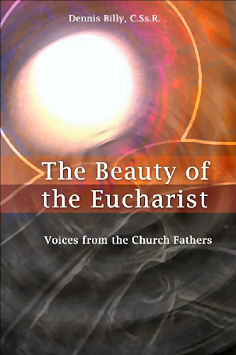
|
Posted December 13, 2011
Book: The Beauty of the Eucharist: Voices from the Church Fathers Author: Dennis Billy, C.Ss.R. New City Press, Hyde Park, NY. 2010. pp. 252 An Excerpt from the Introduction:
This book examines what some of the most prominent voices of Christianity’s distant past have taught about the Eucharist. It focuses not on the Scriptures, where a wealth of material has already been made available for popular consumption, but on twenty-three sources from the lat first century to the early seventh century C.E. An Excerpt from the book: Clement Clement’s letter to the Corinthians provides us with important information about the earliest evidence pointing at least to the beginning of the theory of Roman primacy has to do with a controversy concerning the proper order in the liturgical assembly. For Christians, the liturgy lies at the very heart of their belief and practice. It shapes the community self-understanding, its way of seeing God, and its relationship to the world. In the late-first century, the Church of Rome saw the importance sound liturgy for the life of the entire community and was willing to take concrete steps to resolve conflicts even when they arose beyond its borders. It did so out of a sense of the universal scope of the liturgy, sensing that discord in any local community affected the life of the entire Church. Today, many Christian communities have lost this sense of the role liturgical worship plays in shaping their faith and providing them with their moral bearings. As in the case of the Church of Corinth, it sometimes takes an interested but outside onlooker to rekindle an appreciation of the central role the Eucharist plays in this regard. Given the liturgical focus of the letter, Clement’s focus on the life of virtue in the early part of the letter should come as no surprise. In nourishing the Christian community through both Word and sacrament, the Eucharist enables those participating to share more deeply in Christ’s Paschal Mystery. In doing so, they gradually become conformed to the mind of Christ and exhibit in their own lives the very same virtues Christ embodied in his. Clement hints in his letter that the Corinthians don’t see the interconnection the proper liturgical order and their spiritual growth. Table of Contents: Clement of Rome: Evolving Structures Ignatius of Antioch: Real discipleship The Martyrdom of Polycarp: dying for Christ The Didache: Church order Justin Martyr: Explaining the faith Irenaeus of Lyons: Correcting error Clement of Alexandria: Christian Gnosis Tertullian of Carthage: Emerging concepts The Apostolic Tradition: A Eucharistic prayer Origen of Alexandria: Spiritual meanings Cyprian of Carthage: Mingling water with wine Athanasius of Alexandria: countering the Arian threat Cyril of Jerusalem: sharing the fullness of life Hilary of Poitiers: Defending the faith Ambrose of Milan: food for the journey Basil the Great: loving service of God and others Gregory of Nazianzus: receiving divine medicine Gregory of Nyssa: restoring the divine image John Chrysostom: real present and real sacrifice Jerome: true sacrament of Passover Augustine of Hippo: bread of love Leo the Great: proclaiming the real presence Gregory the Great: Holy sacrifice of Christ |
|
